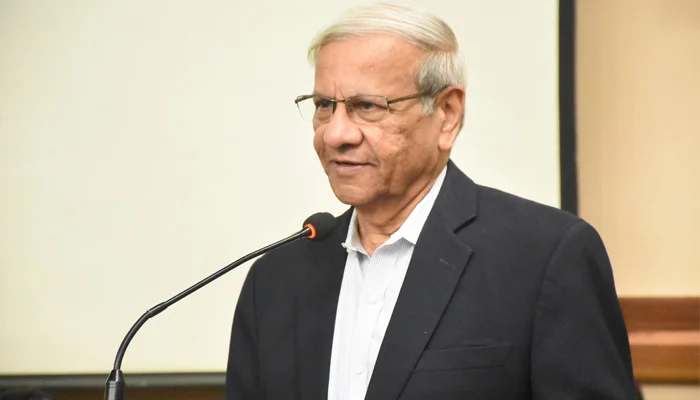Renowned Economist Dr Kaiser Purposed Charter of Economy for Sindh

This image may be subjected to copy right we are not owner of this picture its downloaded from internet.
KARACHI: The renowned economist Dr Kaiser Bengali proposed a Charter of Economy for Sindh during a lecture session at the Rangoonwala Conference Hall of the Applied Economics Research Centre of the University of Karachi.
The KU AERC has invited Dr Kaiser Bengali to highlight the real problems of social and economic problems of the provinces and how people can come out of the current situation.
He observed that governments should secure the household and macro-economies, and proper flood management in Sindh. He advised priorities should be given to regional and urban development and work on finding new resources.
According to him, the Roti, Kapra aur Makaan, sums up the basic aspiration of the people, so that ensuring food security is the foremost duty of the state and gives the idea that most essential food items like wheat, pulses, onions, cooking oil, vegetables, and spices, all must be grown in the province and shared that these items are capable of being grown in Sindh.
He said that there should be no dependence on essential food imports and mentioned that imports are subject to the rising cost of foreign exchange, contribute to food inflation, and also adversely impact the lower-income groups disproportionately.
Dr Kaiser Bengali advised that acreage must be fixed district-wise to produce the required quantities and said that a necessary incentive structure should be instituted to provide growers with reasonable returns.
He observed that sugarcane is a coastal crop and said that its cultivation should be permitted in coastal districts only like Thatta, Sujawal, Badin, Tando Muhammad Khan, Tando Allahyar, and Hyderabad and mentioned that acreage released from sugarcane cultivation in all other districts which estimated at 200,000 hectares will become available for other essential crops.
He said that governments should ensure that people have a house, water supply, wastewater disposal, electricity and gas, and a clean, orderly neighborhood, besides providing employment opportunities as the overarching need for survival is employment.
He said that employment can easily be generated by commodity sectors of the economy, primarily agriculture, and industry.





